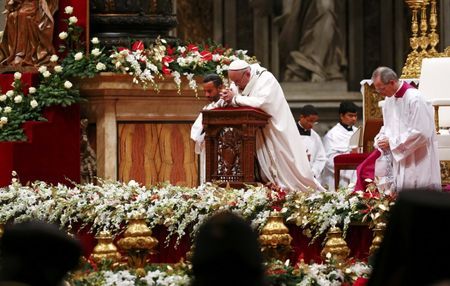
If you're a Christian who exploits people, leads a double life or manages a "dirty" business, perhaps it's better not to call yourself a believer, Pope Francis suggested in a homily on Thursday in Rome.
"So many Christians are like this, and these people scandalize others," Francis said during morning Mass at Casa Santa Marta, according to Vatican Radio. "How many times have we heard — all of us, around the neighborhood and elsewhere — 'But to be a Catholic like that, it's better to be an atheist.' It is that: scandal."
"But what is scandal? Scandal is saying one thing and doing another."
In the Catholic Church, causing scandal also a grave offense. Examples of such sins abound, the Pope said, from money launderers to business owners who take beach vacations while stiffing their employees.
Francis' sermon, as is customary, was an extended riff on Thursday's Mass readings, which include a passage from the Gospel on Mark. In it, Jesus says it is better to be drowned than to cause others to sin.
Drawing on that passage, the Catholic Catechism says scandals include business leaders who encourage fraud, teachers who agitate students and manipulators who turn people away from moral values.
In other words, anyone who leads others to do wrong, directly or indirectly, is responsible for the evil he has encouraged, the church says. So when Francis compares hypocritical Christians to atheists, he's not being flip; he's trying to protect his flock.
In the United States, some Catholics have cited the church's teachings on scandal to argue that priests should not distribute Holy Communion to politicians who support abortion rights. Francis, a sharp critic of capitalist excesses, turned his scorn instead on greedy businesspeople.
Fake Christians
While many of this Pope's pronouncements are often assumed to be novel interpretations of Christian doctrines, Francis was also touching on an ancient debate: Is salvation open to all believers, or only those who do good while on earth?
The Pope suggested the latter, in characteristically blunt language.
He imagined a wealthy Christian knocking at the gates of heaven and saying, "Here I am, Lord! … I went to Church, I was close to you, I belong to this association, I did this… Don't you remember all the offerings I made?"
To which Jesus may reply, according to the Pope: "Yes, I remember. The offerings, I remember them: All dirty. All stolen from the poor. I don't know you.' That will be Jesus' response to these scandalous people who live a double life."
Thursday's sermon is far from the first time Francis has targeted Christian hypocrites. In a sermon last February, the outspoken Pope called out the "fakeness" of Christians who talk piously, but do little to help others.
"To be a Christian means to do: to do the will of God — and on the last day — because all of us we will have one — that day what shall the Lord ask us? Will He say: 'What you have said about me?' No. He shall ask us about the things we did."
It isn't the first time the Pope has mentioned atheists, either. In 2013, he raised questions for saying that heaven is open, potentially, to all people.
"The Lord has redeemed all of us, all of us, with the Blood of Christ: all of us, not just Catholics. Everyone. "'Father, the atheists?' Even the atheists. Everyone!"
Francis continued, "We must meet one another doing good. 'But I don't believe, Father, I am an atheist!' But do good: we will meet one another there."
The Vatican later issued a note clarifying that the Pope was simply saying that God's grace is free to all, even atheists, and urging Christians and non-believers to work together.




